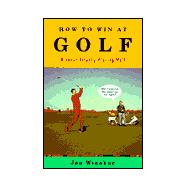
| Foreword | xiii | ||
| Caveats and Disclaimers | xvii | ||
| PART I: FUNDAMENTALS OF GOLFMANSHIP | 1 | (4) | |
|
|||
|
|||
|
|||
|
|||
|
|||
|
|||
|
|||
| PART II: YOUR OWN PETARD | 5 | (18) | |
|
|||
|
|||
|
|||
|
|||
|
|||
|
|||
|
|||
|
|||
|
|||
| PART III: KNOW YOUR ENEMY | 23 | (46) | |
|
|||
|
|||
|
|||
|
|||
|
|||
|
|||
|
|||
|
|||
|
|||
|
|||
|
|||
|
|||
|
|||
|
|||
|
|||
|
|||
|
|||
|
|||
|
|||
|
|||
|
|||
|
|||
|
|||
|
|||
|
|||
|
|||
|
|||
|
|||
|
|||
|
|||
|
|||
|
|||
|
|||
|
|||
|
|||
| PART IV: MATCHMANSHIP | 69 | (22) | |
|
|||
|
|||
|
|||
|
|||
|
|||
|
|||
|
|||
|
|||
|
|||
|
|||
|
|||
|
|||
|
|||
|
|||
| PART V: TRICKS OF THE TRADE | 91 | (30) | |
|
|||
|
|||
|
|||
|
|||
|
|||
|
|||
|
|||
|
|||
|
|||
|
|||
|
|||
|
|||
|
|||
|
|||
|
|||
|
|||
|
|||
|
|||
|
|||
|
|||
|
|||
|
|||
|
|||
| PART VI: CONVERSATION: THE FIFTEENTH CLUB | 121 | (40) | |
|
|||
|
|||
|
|||
|
|||
|
|||
|
|||
|
|||
|
|||
|
|||
|
|||
|
|||
|
|||
|
|||
|
|||
|
|||
|
|||
|
|||
|
|||
|
|||
|
|||
|
|||
| PART VII: EQUIPMENT WORK | 161 | (10) | |
|
|||
|
|||
|
|||
|
|||
|
|||
| PART VIII: TERMINOLOGY | 171 | (10) | |
|
|||
|
|||
|
|||
| Afterword | 181 | (2) | |
| Acknowledgments | 183 | (2) | |
| Index | 185 |
The New copy of this book will include any supplemental materials advertised. Please check the title of the book to determine if it should include any access cards, study guides, lab manuals, CDs, etc.
The Used, Rental and eBook copies of this book are not guaranteed to include any supplemental materials. Typically, only the book itself is included. This is true even if the title states it includes any access cards, study guides, lab manuals, CDs, etc.
Excerpted from How to Win at Golf: Without Actually Playing Well by Jon Winokur
All rights reserved by the original copyright owners. Excerpts are provided for display purposes only and may not be reproduced, reprinted or distributed without the written permission of the publisher.